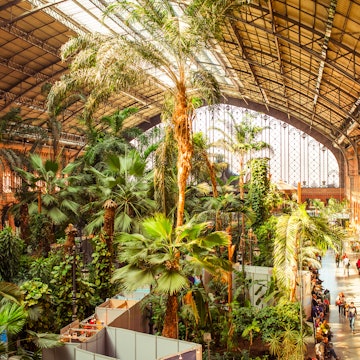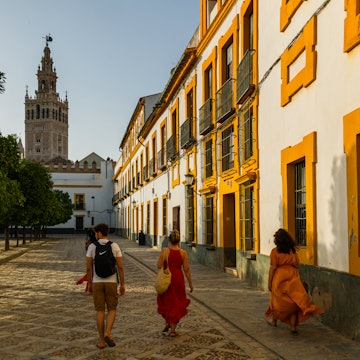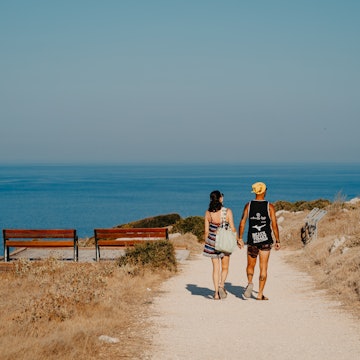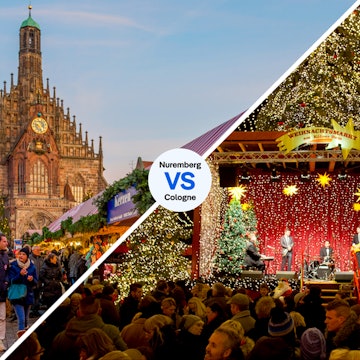
Europe in shoulder season: 11 of the best cities to see this September and October

Aug 23, 2025 • 8 min read

Experience a seaside sunset in Dubrovnik. JasminaS/Shutterstock
We all want the dreamy bits of Europe: the lazy alfresco dinners, the museums you want to get lost in, the coastlines and striped umbrellas. But no one wants to sweat through a two-hour line or jostle for space on a beach towel. That’s why we’re firmly on Team September–October. The sun’s still hanging around (especially down south), but the summer stampede has eased off.
This is Europe’s sweet spot. The shoulder season, the clever season, the “why didn’t I do this sooner?” season. The locals aren’t burnt out from tourists, hotel prices are kinder, and you can enjoy a pace that feels a little more local. Yes, the odd cafe might be shuttered, and you may have to share the beach with a few other savvy travelers, but it’s a small trade-off for the savings and overall experience.
Here’s our pick of the best European cities to visit in the shoulder season.

1. Rome, Italy
Best for sightseeing and festivals
Rome in summer is beautiful, but it's also hotter than a pizza oven. With heatwaves pushing 42°C (107°F), even locals avoid the midday sun, so imagine trying to walk around the Roman Forum and enjoy it. This is why September and October are the golden months. Days mellow out to a pleasant 24°C (75°F), the worst of the tourist crush has eased, and you can actually linger in the Forum without melting into the cobblestones. September still has plenty of life, just without August’s sweaty chaos, and October brings even cooler days.
It’s the same story across much of Italy, where it’s warmer in the south, milder in the north. September is grape harvest season, so you’ll find wine festivals and food fairs popping up from Tuscany to Sicily. For anyone visiting Rome, it’s the perfect excuse to escape to the Alban Hills for Italy’s oldest wine festival, the Sagra dell’Uva (Grape Festival), held each year in the hilltop town of Marino, just a 45-minute train ride from Roma Termini.
By October, the leaves start to blush, the air gets that crisp, cozy feel, and every now and then, you’ll get a rainy day.
Planning tip: Big cities like Rome and Milan stay open year-round, but in smaller towns and coastal spots, some restaurants and attractions might have closed for the season. Always check before you go.

2. Dubrovnik, Croatia
Best for a coastal escape without the cruise ship crowds
Early September in Dubrovnik is still peak summer energy, but give it a couple of weeks, and the tempo shifts. The sun’s still shining, the sea is still swim-perfect, but the crowds thin out, and those towering cruise ships start showing up less often. Suddenly, strolling the city walls feels relaxed instead of like rush hour.
By October, Dubrovnik is even calmer, with cooler days making kayaking, hiking or just wandering the marble streets pure pleasure. Hotels drop their rates, it’s easier to snag a table with a sea view, and the Good Food Festival rolls in to keep things deliciously local.
Planning tip: Most of the city stays open through October, but some beach bars and smaller tour operators close toward the end of the month. Ferries and island day trips scale back, so if you’re planning to hop beyond the mainland, lock in your transport early.

3. Budapest, Hungary
Best for thermal baths and food festivals
Budapest in September and October is like the city just exhaled. The summer heat slips away, the Danube glows gold at sunset, and locals come out for crisp riverside walks. It’s the perfect weather to sink into the famous Gellért Baths or Széchenyi Thermal Bath.
It’s also festival season. September brings the Budapest Wine Festival, followed in October by Oktoberfest and Art Market Budapest, a contemporary art fair at Millenáris Park showcasing artists and designers from around the world.
Planning tip: The baths are busiest on weekends and late afternoons, so go early or midweek for maximum bliss. And if you’re aiming for the festivals, book your tickets and stay ahead of time; autumn still draws a lively crowd.

4. Lisbon, Portugal
Best for culture and alfresco dining
Lisbon in early autumn is a whirl of design weeks, biennales and food festivals, but the city never really sits still. It’s warm enough for an espresso and pastel de nata on a sunny terrace, cool enough to climb Alfama’s maze of streets without sweating through your shirt.
Festival season is in full swing: MotelX (the cult horror film fest), Caixa Alfama (live Fado in the neighborhood where it was born) and European Heritage Days, when Lisbon’s most iconic buildings swing open their doors for free tours and rare behind-the-scenes peeks.
Even the beaches nearby, like Cascais and Costa da Caparica, are still in summer mode. Surf in the afternoon, be back in the city by sunset for rooftop drinks.
Planning tip: Lisbon’s best festivals and heritage tours often have limited spots. Book in advance unless you want to be that person peering through the gates.

5. Athens, Greece
Best for ancient sites without the heat (and a nightlife reboot)
Athens in July or August? Brutal. If you’ve ever tried climbing the Acropolis in 38°C (100°F) heat, you know. Come September, the mercury drops to friendly levels, and suddenly sightseeing, hiking and even a little island hopping are back on the cards. Prices dip, too, with hotels and tickets to major attractions offering discounts and special rates.
By autumn, locals have returned from their island escapes, and the nightlife kicks up again. October marks the start of theater and opera season, giving you something to do after a day of temples and ruins.
Planning tip: Some archaeological sites close earlier post-summer, and bigger island hotels may shut their doors; check ahead so you’re not caught out.
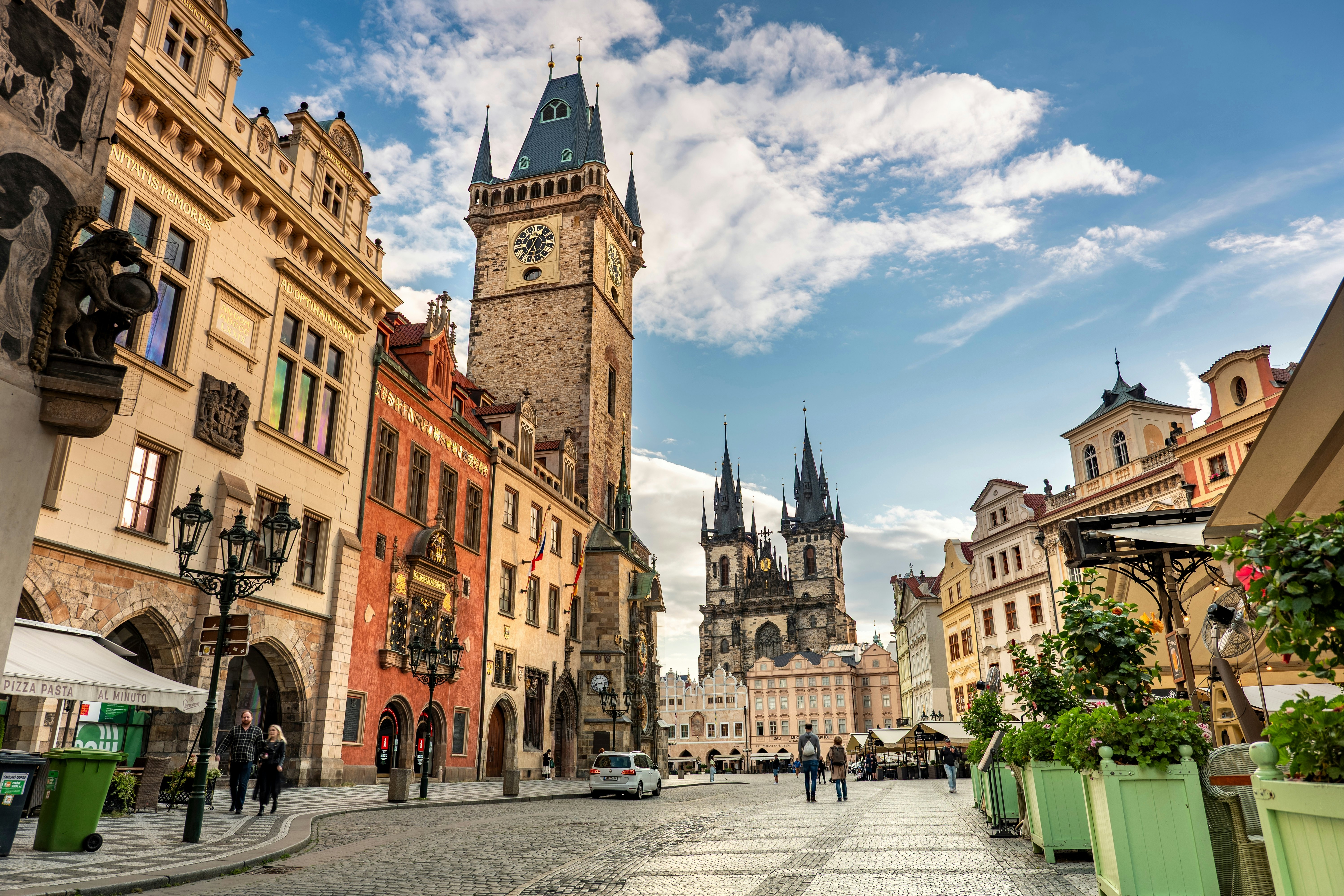
6. Prague, Czechia
Best for outdoor activities
Prague always feels like a fairy tale, but in autumn, the city turns truly cinematic. September’s sunny days are perfect for riverside walks, and by October, golden leaves drift over cobblestones, giving the whole city that “candlelit wine bar” mood.
Cultural highlights include the Dvořák Music Festival and the Prague Signal Festival, which lights up the city with art and sound. Bonus: off-season hotel rates mean you can splurge on that view of Charles Bridge.
Planning tip: Smaller museums and historic sites may cut back hours in the shoulder season. Bring a light jacket, book concerts in advance, and keep an umbrella handy.

7. Nice, France
Best for sun-soaked swims and easygoing days
Nice has glamour in its DNA, with luxury hotels, Riviera sunshine, and more people-watching than you can handle. It’s busy all year, but mid-September brings a subtle shift: fewer crowds, easier dinner reservations, and the Mediterranean still warm enough for a blissful swim. Just remember, Nice likes a dress code, with “no jeans, no sneakers” being the golden rule.
Prices stay high, but by mid-October, deals start popping up. Then in December, the city flips into holiday mode with Christmas markets and seasonal sparkle.
Planning tip: The sea is swimmable well into October, so yes, pack the swimsuit. And if you’ve got your heart set on a chic dining spot, book ahead, even in the off-season.

8. Copenhagen, Denmark
Best for cozy cafes, museums and shopping
Autumn in Copenhagen is peak hygge season. The days get shorter, the cafes get warmer, and that golden light makes the whole city look like a Wes Anderson set. Locals bundle up under heat lamps on terraces, while boutiques quietly swap in their winter collections.
It’s also a good time to nab that impossible table at Alchemist or Udtryk. With hotel rates easing and the fashion scene in full swing, autumn here is equal parts style and substance.
Planning tip: September to November is rainy season, so pack layers you can actually walk in. And book top restaurants early.

9. Amsterdam, Netherlands
Best for festivals and cheap hotels
September is one of the liveliest months to visit Amsterdam, thanks to a full lineup of festivals, Amsterdam International Fashion Week and Jordaan Festival. The pleasant early autumn weather is perfect for long strolls and experiencing the city’s cultural scene. By October, the city takes a breath. Leaves float in the canals, museums feel roomier, and hotel rates start to ease. It’s a slower, more reflective Amsterdam, perfect if you like your city breaks with a side of stillness.
Planning tip: With fewer tourists, cycling is pure joy. Grab a bike and spend a day in the parks or along the water.

10. Seville
Best for wine tasting and culture
September is grape harvest season in Spain, which means the wine festivals come thick, fast, and joyfully boozy. Base yourself in Seville and spend your days winding through Andalusia’s vineyard-covered hills, tasting rich reds and crisp whites, celebrated with music, food and plenty of toasts. Cooler evenings also mean flamenco kicks up a notch in the city, and tapas bars buzz with both locals and visitors.
Planning tip: Vineyards are often best reached by car, so book a guided day trip or arrange private transport.

11. Zürich, Switzerland
Best for alpine air and chocolate season
September and October are Zürich at their most delicious with cooled, blue-sky days, perfect for lakefront walks or a quick cable-car ride into the Alps before the snow arrives. In September, studios and shops open their doors for Zürich Design Weeks. Live out your Night at the Museum fantasies on the first Saturday of September when museums and even the zoo keep their doors open late for Zürich's Long Night of Museums. Later in the month, the Zürich Film Festival rolls out more than 100 films over 11 days.
By October, the city smells of roasted chestnuts, and bakeries start rolling out seasonal chocolate creations. Add in fewer queues at museums and easier dinner reservations, and you’ve got a Swiss escape that’s equal parts scenic and delicious.
Planning tip: Many Food Zurich events take place in pop-up venues or smaller restaurants, so check locations carefully and give yourself time to get between them.

















